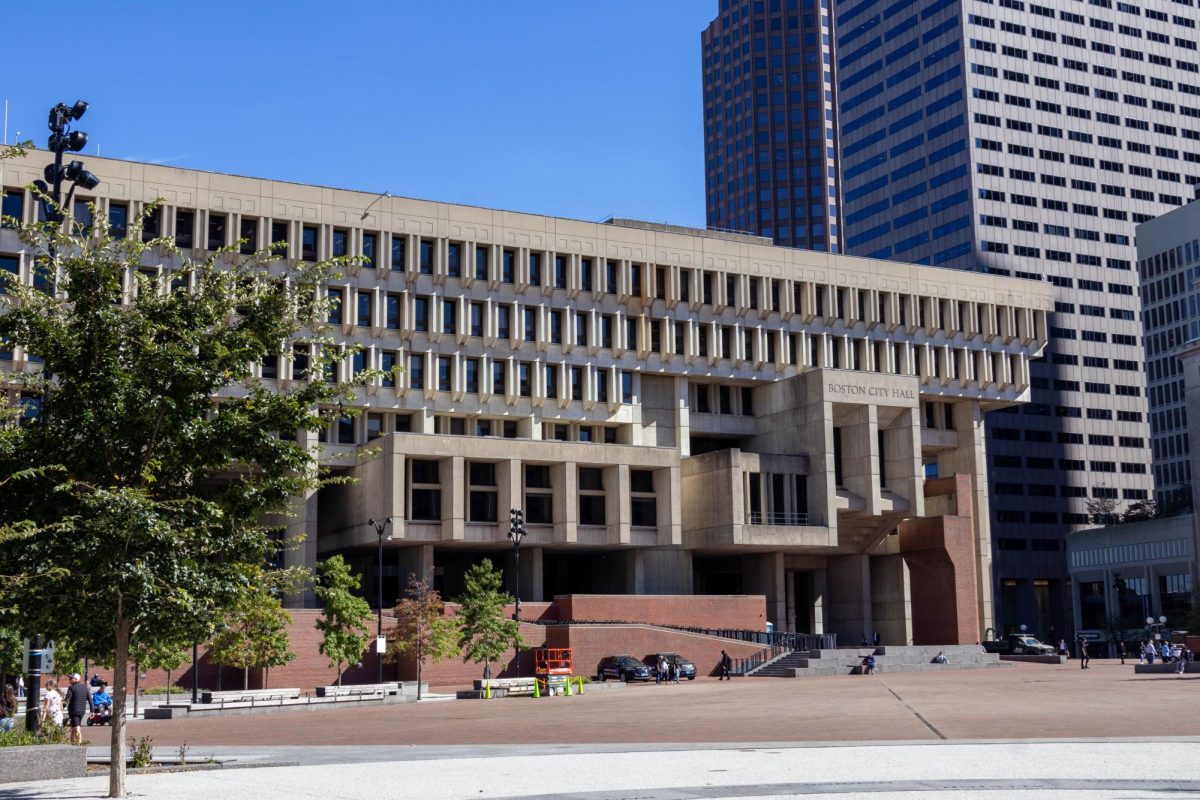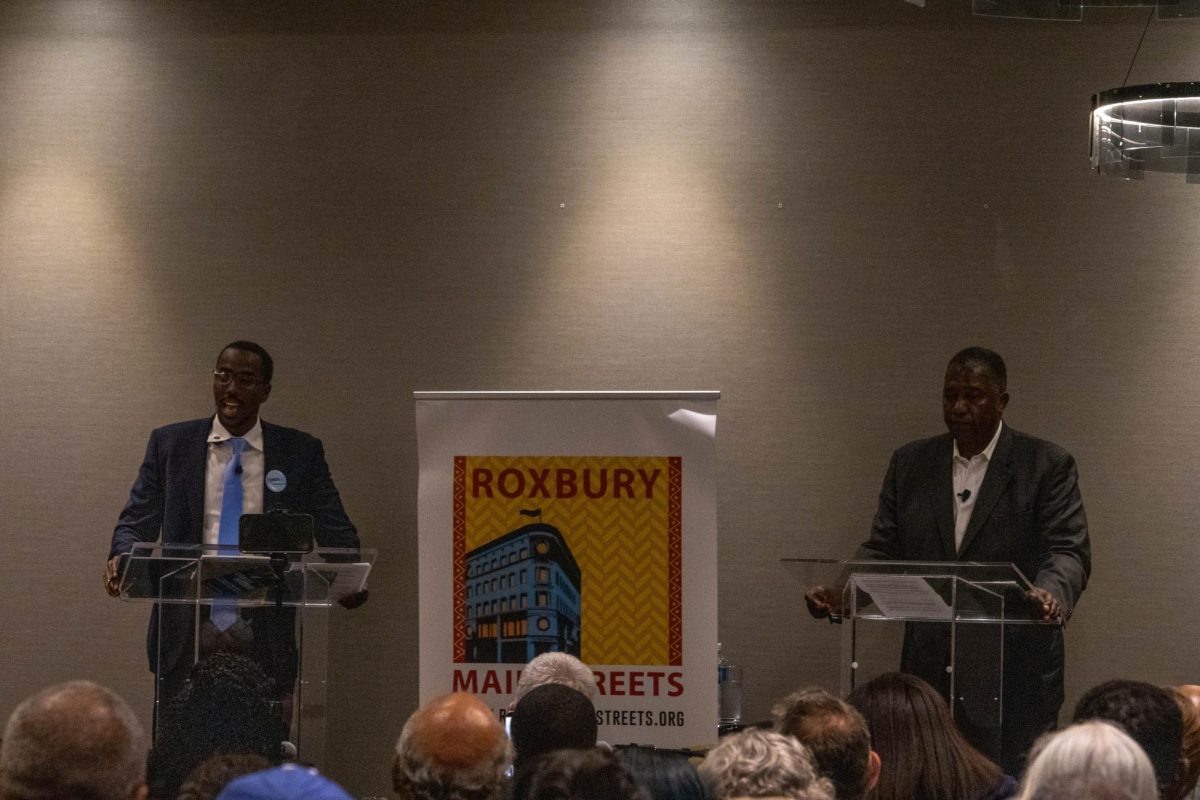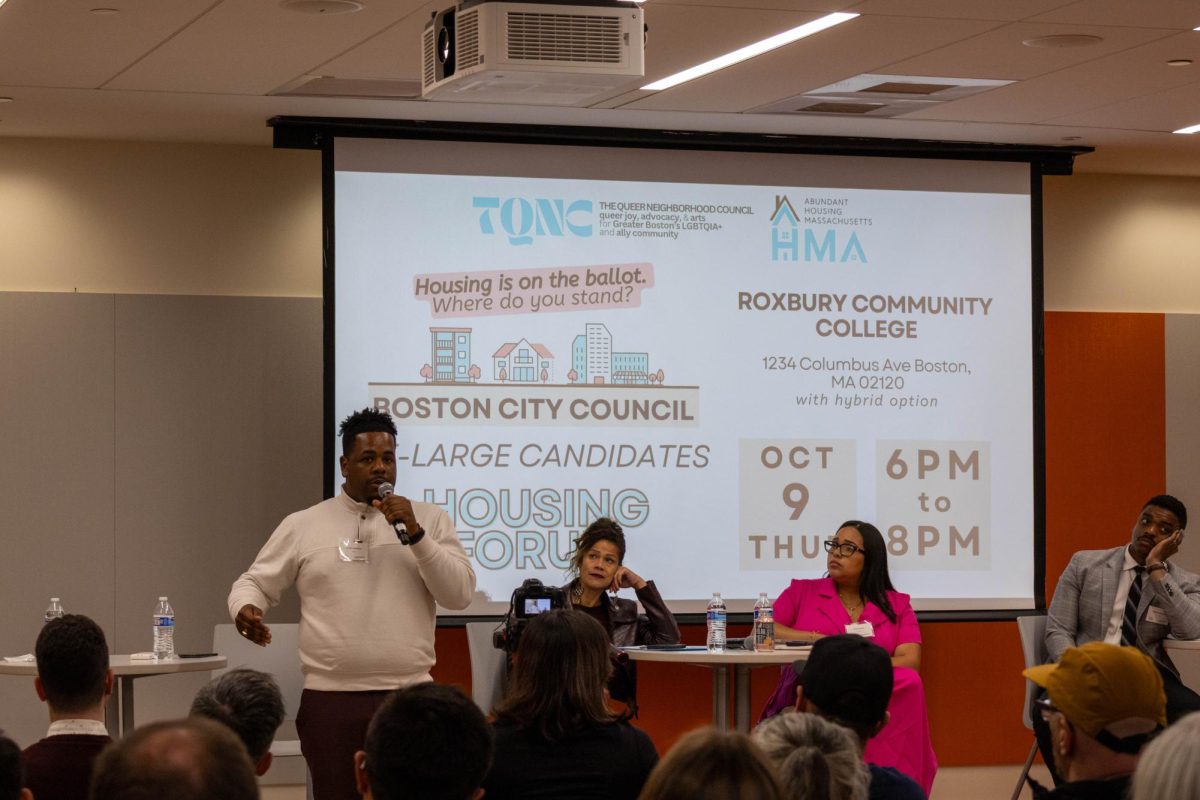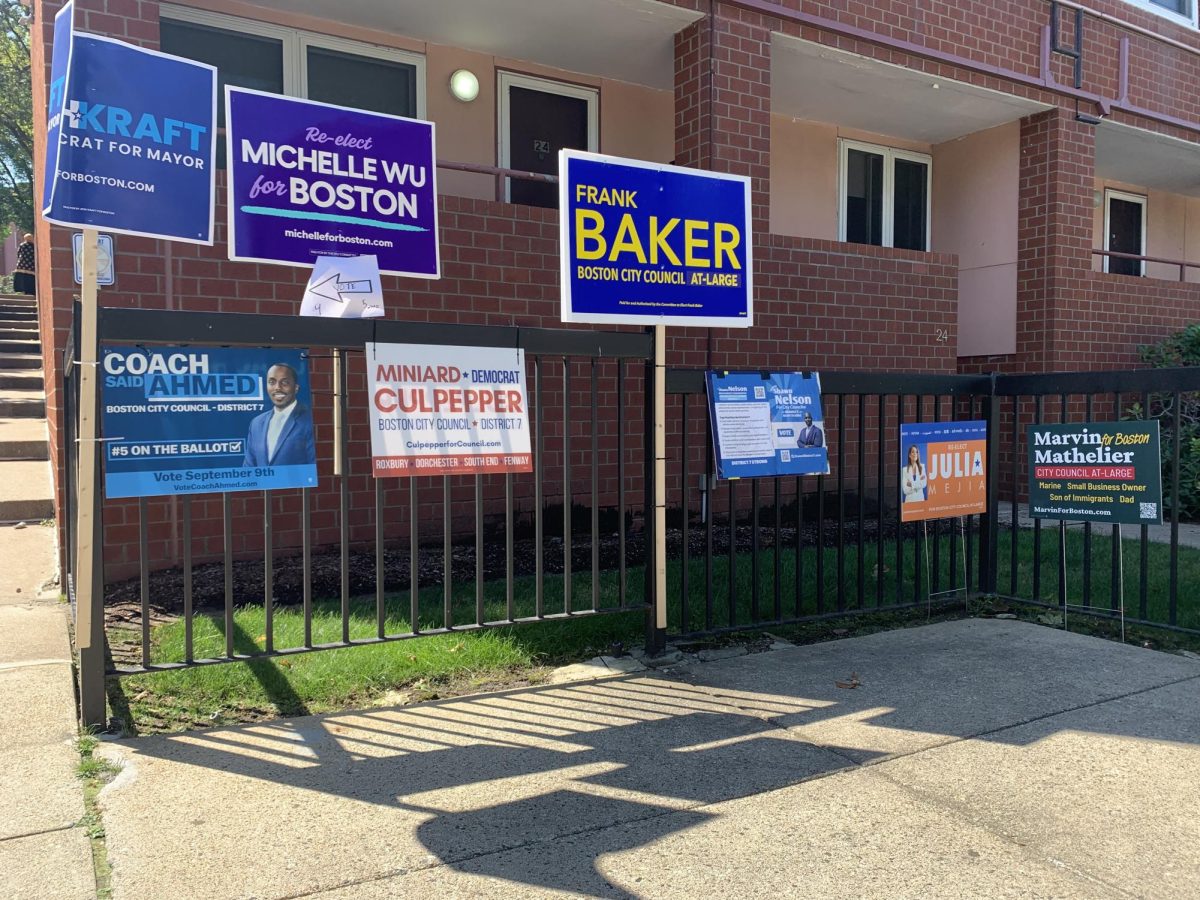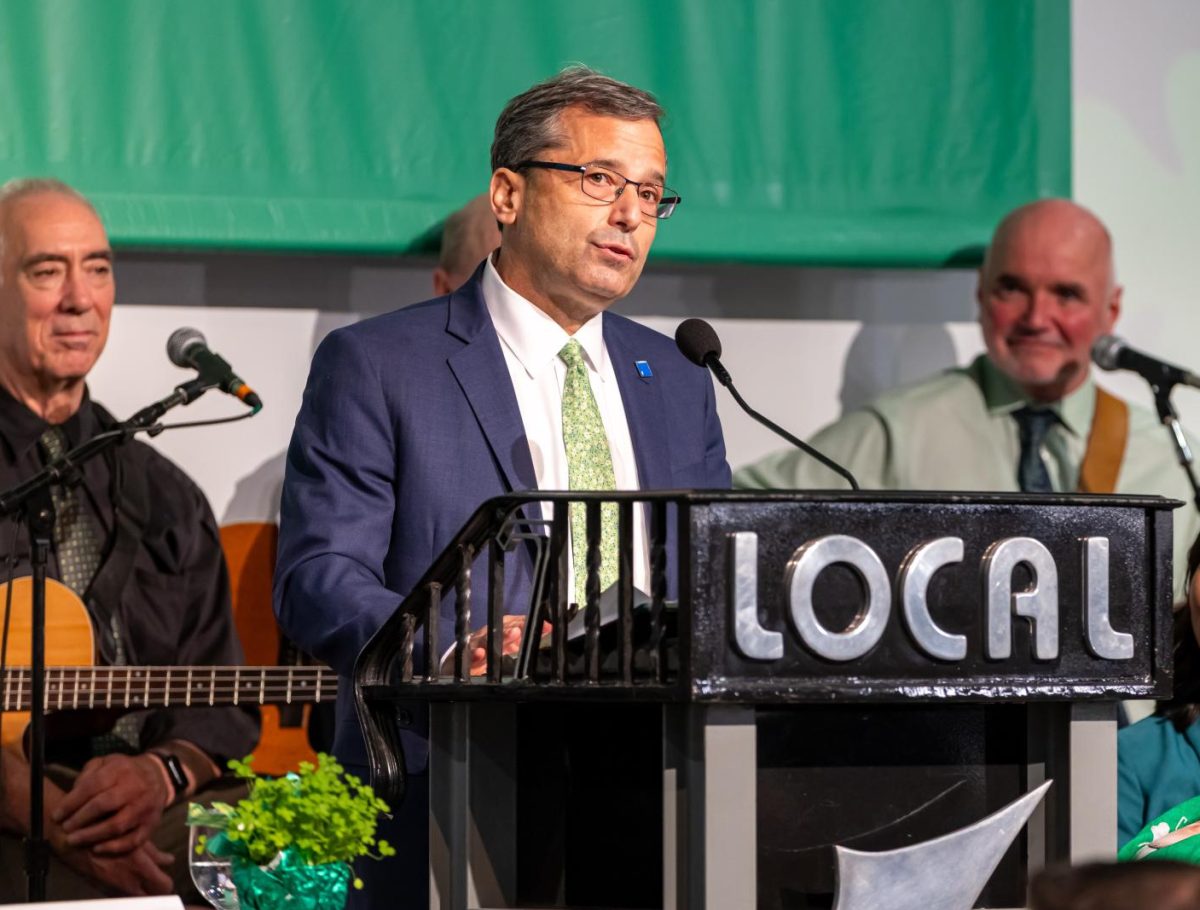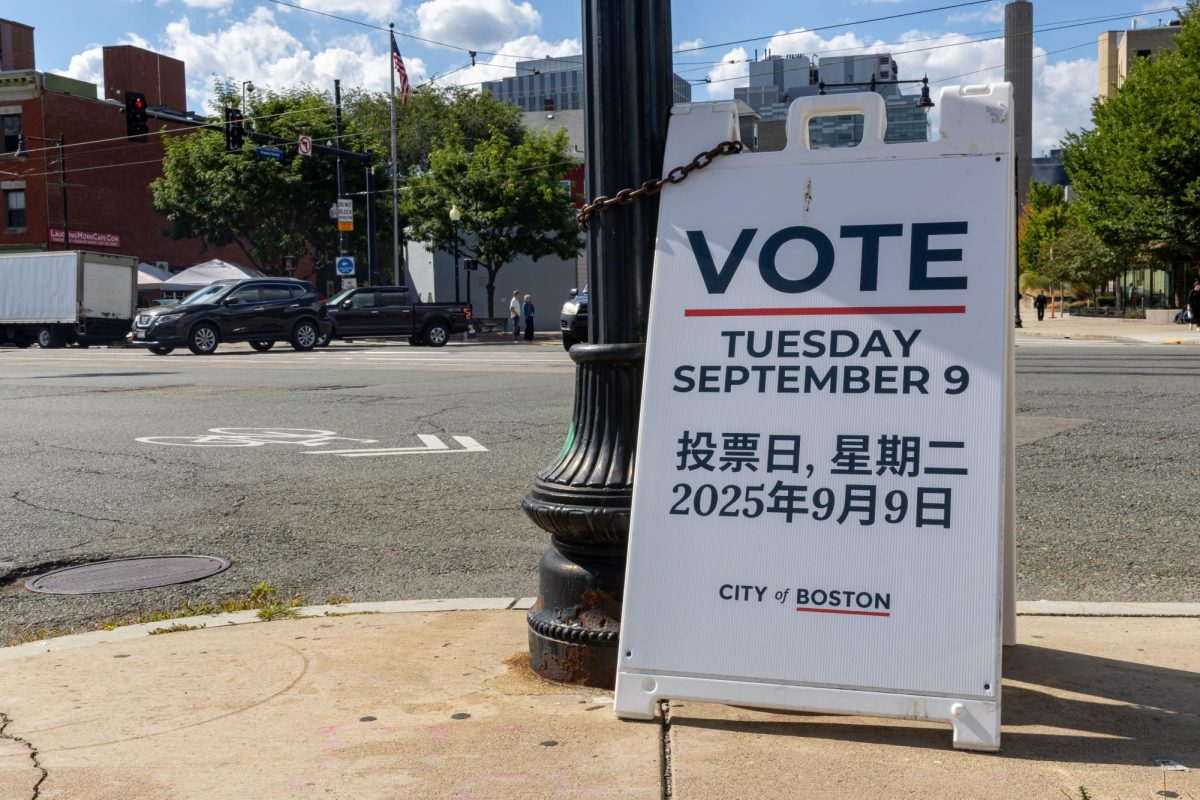- Why did you run for city council?
Ed Flynn:
I ran for City Council 8 years ago because I want to improve access to city services and quality of life for my neighbors and constituents. My focus remains the same today as I now run for my fifth term as City Councilor for District 2. Over the last eight years, my priorities have been to focus on improving public and pedestrian safety for my constituents, supporting our working and immigrant families in earning a livable wage, increasing affordable housing stock, ensuring our public housing residents live in dignity, and giving residents the opportunity to voice their concerns during a genuine community process on issues impacting our neighborhoods. I enjoy working with people of District 2, meeting and listening to my constituents every day on how we can better deliver services and improve the quality of life for all neighbors in the City of Boston.
Brian J. Worrell:
As someone who was born in Dorchester and raised by parents who migrated to the United States from Jamaica and Barbados in search of the American dream, I ran for office in 2021 to give back to my community to ensure others had access to the opportunities I had in this city, from receiving a quality education to being able to start my own business here.
Winston Pierre:
Out of a 4.6-billion-dollar city budget, District 5 is set to receive just 1.5 million dollars, the lowest of any district in Boston. Simply put, District 5 gets pennies on the dollar. And that inequity is not just numbers on a page - it shows up every day in our neighborhoods. You see it in the conditions at Chittick Elementary School, the lack of street safety on Wood Avenue and Washington Street, where we have recently lost two young black boys. You see it in major planning projects along Cummins Highway and Blue Hill Avenue that move forward without real community participation. And you see it in the displacement of small businesses in Roslindale, along with the many empty storefronts that remain untouched.
I decided to run for City Council because too many of our communities - Mattapan, Hyde Park, Readville, and Roslindale - are being left out of Boston's progress. Families are working hard every day but cannot keep up with rising rents. Small businesses are fighting to survive while new developments move in with little connection to the people who built these neighborhoods. I am running to make sure our communities have a real seat at the table - where our voices guide decisions, our values shape policy, and our neighborhoods share in Boston's growth.
Said Ahmed:
I am running for City Council because this community built me. When I came to Roxbury as a 12-year-old refugee, I did not know the language or anyone here, but this community gave me a home and a chance. It taught me what resilience looks like, what it means to stand up for each other, and how powerful we are when we come together.
2. What issues do you plan to address first and how?
Ed Flynn:
Right now, I believe a top priority that we face in the City is the ongoing Mass & Cass crisis. The troubling conditions at Mass & Cass have sprawled over and into surrounding neighborhoods in the South End, South Boston, Roxbury, and Dorchester. I represent a large portion of the South End as well as South Boston, which have experienced increased public safety and public health incidents, especially in the last year, in which there were residential and business break-ins, assaults on residents, and public drug dealing and use on residents’ stoops, and trespassing in backyards. Over the summer, a child was struck by a needle in South Boston - a parent’s worst nightmare.
Any reasonable person who visits Mass & Cass today will conclude that the city’s plan is an abject failure by any standard. What has taken place there for over a decade is completely unacceptable - an open air drug market, public drug use, the human trafficking of women, acts of serious violence, public defecation and urination. Earlier in September, together with District 3 Councilor John Fitzgerald, we held a public hearing in the community on Mass & Cass. I continue to believe that we should have zero tolerance for open-air drug dealing and public drug use, human trafficking, crime, and assaults. We also need Massachusetts Criminal Justice Reform, and a state sentence for dealers who prey on our most vulnerable. I also believe in a treatment-first approach to address the underlying issues of addiction. For years, the city has continued to emphasize the homeless crisis. But we can’t provide housing first and enable those with addiction issues to continue harming themselves behind closed doors. They need detox and a pathway to recovery services to address the underlying mental health and behavioral health issues. Housing alone does not address their root causes.
It is long overdue for the city to put wish lists and other pursuits aside and make a Recovery Campus the top priority for the City of Boston. Recently at the Boston City Council, my colleagues unanimously voted to support my resolution to prioritize a recovery center to address this public safety, public health, and humanitarian crisis. It is also critical that services be decentralized and spread out to other locations across the Commonwealth, as this is a statewide issue that warrants a statewide response.
Brian J. Worrell:
Since being elected as the District 4 Councilor, I have been able to work on the challenges facing our district and leverage my knowledge and experiences with city government to contribute to building and strengthening our neighborhoods. Since taking office, I am proud to have secured historic capital funding for my district, expanded homeownership opportunities, and worked on tackling the root causes of violence. My initiatives include the successful expansion of liquor licenses for underrepresented zip codes, a home ownership development fund, and advancing the Black and Brown empowerment agenda. I am also proud to serve as the Chair of the Committee on Ways & Means and the Vice President of the Council. I am running for reelection to continue this work on key issues like community safety, economic development and opportunity, public education, and affordable housing.
Winston Pierre:
My top priorities are housing, public safety, and economic opportunity. We need more affordable housing that working families can access - not just luxury developments with a few so-called affordable units. I will push for community land trusts, stronger tenant protections, and faster permitting for projects that focus on affordability.
On safety, I will work with police, youth programs, and neighborhood associations to rebuild trust and invest in prevention — mentorship, jobs, and mental health supports. When it comes to economic opportunity, I want to see city contracts and business resources reach our local entrepreneurs — especially women and minority-owned businesses.
Said Ahmed:
We are in a housing crisis, too many families who built this city can no longer afford to stay here. I will work to expand affordable and family-sized housing, push for community land trusts, and make sure city-owned land is used for the public good, not speculation.
In our schools, I have seen firsthand what our kids need. As a longtime educator, I will fight for stronger funding, more after-school programs, and real support for teachers and families.
On day one, I will open a district office right here in the community, so residents do not have to take a day off work just to be heard. City government should be accessible to every resident, and I will fight to make sure it is.
For over 15 years, I have worked in our schools and built free youth programs because I have seen the potential in our young people when someone believes in them. Through my work, I have also seen the struggle, families being priced out, small businesses hanging on by a thread, and our schools struggling to provide for our youth.
I am running to make sure our neighborhoods have a real voice in City Hall. The people who built Roxbury, Dorchester, the South End, and Fenway deserve leadership that listens and delivers. We need housing that our families can afford, schools that give every kid a fair shot, and safe streets that reflect compassion and accountability.
3. How will you support small businesses in your district?
Ed Flynn:
Since being elected as City Councilor, I have supported and continue to support our small businesses in our neighborhoods. I regularly work with business leaders and neighborhood development organizations such as the Downtown Boston Alliance, Chinatown Main Street, South Boston Neighborhood Development Corporation, South End Business Alliance, and Back Bay Association to ensure that small businesses have what they need to succeed. I regularly work with these organizations to schedule public safety and pedestrian safety walkthroughs and listen to their comments and feedback. I also attend, support, and promote their events, from street festivals, fairs, and sidewalk sales.
I have heard from many small businesses over the last two years on how the City’s community process in regards to bike lanes have not factored in small businesses’ concerns. I held my own community meeting regarding the Boylston Street Bus and Bike lane to hear community feedback when residents did not feel that they were given a genuine opportunity to be heard. The bus lane proposal was subsequently scrapped by the city months later, as, similar to the Summer Street Bus Lane Pilot, it was found to not work as intended.
I will continue to support and listen to our small businesses on what is working and not working for them as they are the lifeblood of our city and what makes Boston special.
Brian J. Worrell:
As a Councilor, I launched the Black and Brown Economic Empowerment Agenda to make progress and accountability on key economic initiatives, including supporting our main streets and small businesses, increasing diversity in city contracts, and expanding access to job training and career pipelines. I successfully secured 225 new liquor licenses as a historic investment with more than a $100 million value for the city’s underserved neighborhoods in partnership with Governor Healey and the state legislature. And lastly, I have continued to stand with workers in their advocacy for better pay and conditions. Additionally, at my urging, the city piloted a snow-pay rate for many of our essential city workers, ensuring they get extra pay for working in tougher conditions.
Winston Pierre:
Our small businesses are the heart of our neighborhoods - they are not just storefronts, they are gathering places. I will work to expand access to capital, simplify permitting, and make city resources easier to navigate. I also want to strengthen partnerships between local businesses and schools so that students can learn valuable skills right here in their communities.
Said Ahmed:
It is a tired saying but small businesses truly are the backbone of our community: they sponsor our youth teams, feed families after long days, give our young people their first jobs, and keep our neighborhoods connected. Many of my own friends and family own small businesses here in District 7. It’s a source of pride to see them serve our neighborhoods, but it is also painful to watch them struggle through confusing city bureaucracy, rising rents, and a lack of real support.
City Hall needs to stop waiting until a business is on the brink of closing before stepping in. We need to be proactive in reaching out, listening, and finding ways to help before it is too late. Too many Black and Brown business owners are doing everything on their own, without the same access to grants, capital, or resources that others get. That has to change.
As City Councilor, I will push to make sure city grants and programs actually reach the communities that have been overlooked for far too long. I also promise to open a district office where business owners can get one-on-one help navigating permits, city programs, and the overall city bureaucracy that stops far too many small business owners from thriving.
4. How will you balance the desire for improved nightlife in your district (restaurants and bars staying open later) with public safety and noise concerns?
Ed Flynn:
As the District Councilor representing Downtown, Theater District, and Chinatown, I am often involved in discussions regarding achieving a good balance between nightlife and public safety and noise concerns. In order to achieve the optimal balance, it is critical to always engage with neighborhood leaders and residents, as they have years of institutional knowledge on the day-to-day happenings in their community.
We want responsible restaurant and bar owners that enhance quality of life, such as bringing positive foot traffic, taking care of trash and pest control, and stepping up when patrons are not cooperative. I have supported and continue to support closing hours at 1:00 am or 2:00 am in certain areas of my district as long as there is positive community engagement and the businesses are working in good-faith and being respectful of neighbors.
In the past, I have also hosted community meetings with the city’s Licensing Board and the Boston Police for our Downtown and Theater District restaurants and bars to ensure that they are up to date on the latest rules and violations. It is critical that public safety and noise issues are kept in check and not get out of hand. As City Councilor, I will continue to listen to community feedback, work with Licensing and Boston Police to ensure that our local restaurants and bars have what they need to be a successful and a positive contributor to our neighborhoods.
Brian J. Worrell:
I’m excited that more businesses are choosing our neighborhoods—this means jobs, a stronger local economy, and reinvestment close to home. I support a more vibrant business and nightlife scene, done responsibly and guided by data. I’ll continue to advocate for targeted public-infrastructure upgrades in business districts—better lighting, safe sidewalks, public parking, and reliable transit—with clear standards and consistent enforcement. I also support designated ride-hail zones and coordination with late-night transit.
Culture districts are a proven tool to strengthen both local identity and small-business growth. Building on the success of Little Saigon in Fields Corner—where culturally rooted branding, streetscape improvements, multilingual wayfinding, and coordinated events have boosted foot traffic and supported family-owned shops—we should expand and invest in culture districts across the city. That means supporting merchant associations, funding public art and programming, improving storefronts, and promoting these areas as destinations for residents and visitors alike.
Safety comes first. Late-hour staff should receive TIPS and de-escalation training, high-capacity venues should maintain clear security plans, and district business associations and managers should provide stronger night and weekend coverage. We should also revise the City’s Noise Ordinance to be clearer and more enforceable: set decibel caps by time of night and land-use context, include low-frequency (bass) weighting, standardize meter types and measurement protocols, and apply escalating penalties for repeat violations. Pair this with sound-mitigation grants for small businesses. Outdoor music and patios near homes should end earlier than indoor activity. I’ve worked with businesses and residents to establish simple Good Neighbor Agreements—litter pickup within a set radius, staff-managed lines, after-close cleanup—and to ensure civic leaders have direct contact information.
Winston Pierre:
We can have vibrant nightlife and safe, respectful neighborhoods at the same time. The key is balance. That means working with residents, business owners, and public safety officials to set clear expectations — around hours, outdoor seating, and noise control. I believe in smart growth — supporting restaurants and entertainment while keeping quality of life at the center.
Said Ahmed:
Our neighborhoods deserve to feel alive, but they also deserve to feel safe. I feel confident we can have both. I want to see our local restaurants and community spaces thriving because they keep our community connected and vibrant. With that said, it has to be done with real respect for the people who live here.
As your City Councilor, I will bring everyone to the table (residents, small business owners, artists, and youth) to find that balance. We can identify where it makes sense to extend hours, especially in our business corridors, while keeping our residential streets peaceful.
We also need better late-night transportation, better lighting, and community-rooted public safety presence so everyone feels safe getting home. This is about building a nightlife that reflects who we are as a community, welcoming and rooted in care for one another.
5. What reforms or investments do you think are necessary in Boston Public Schools in your district?
Ed Flynn:
I believe one of the greatest challenges facing the Boston Public Schools is the inequity that exists between high-performing schools and schools that serve high-needs students. While Boston’s exam schools are some of the highest ranking schools in the state, many of our lower performing schools continue to face issues such as high absenteeism, low graduation rates, and low test scores. Moreover, underperforming schools often serve many high-need students – students that lack English proficiency, low-income students, and students with disabilities, and these students deserve a quality education. This is a systemic problem, but to start to address it, we need to first commit to investing in lower-performing schools.
Having said that, I also supported the latest reforms proposed for our exam schools that will provide an opportunity for a citywide round for qualified students regardless of what neighborhood they live in, as well as eliminating bonus points that families and experts found to be not working as intended.
As a City Councilor, I have always centered my decision-making and positions based on input from my constituents, and they are the source of information on education issues. I intend to use my voice as an elected [official] to advocate for the students and families in my district and the city, and I will continue to base my position on community input.
Brian J. Worrell:
As a district, BPS has some key strengths with its proximity to higher education and cultural institutions within our city, access to meaningful partnerships across sectors to enrich our students' lives, our renowned exam schools, and our rich diversity. We also face many challenges with a lack of family engagement, aging buildings and school infrastructure, teacher shortages and a need to attract teachers that reflect the diversity of our communities, persisting achievement gaps especially in light of post-pandemic learning loss, and a lack of intentionality and resources around growing vocational programs, improving our curriculum, and programming that creates pathways to career opportunities. Primarily, I inform my positions by listening to my constituents, meeting with relevant stakeholders doing the work on the ground, including educators, and looking at data and metrics to help analyze problems that need to be addressed. I will continue to have an open line of communication with the BTU in my capacity as an elected official to identify how we continue to tackle persisting issues, while celebrating our wins.
Winston Pierre:
We need to start by listening to teachers, parents, and students — they know what is working and what is not. I would prioritize investments in vocational training, technology, and early literacy. Every student should graduate with a path — whether that is college, a trade, or entrepreneurship. And we cannot forget school infrastructure; our kids deserve safe, modern buildings that reflect their potential.
Said Ahmed:
I am a proud father of BPS students, an English High School graduate, and have worked in BPS for over 15 years. I understand deeply what our youth are up against. Too many of our schools have gone far too long without the investments they need. I have taught in classrooms with broken heat and little supplies, taking money out of my pocket to pay for students' supplies or rushing to make photocopies of textbooks because there were not enough for every student. I have watched athletic programs struggle to stay alive, and students ask for clubs and after-school activities that fall on deaf ears.
Our young people deserve better. Every student in Roxbury, Dorchester, the South End, and Fenway deserves a school that uplifts them, not one that limits them. We need to double down on our children’s future by: majorly investing in and even rebuilding our school buildings, expanding after-school and athletic programs, and building up the wraparound services such as career programs and mental health services.
6. Many residents and small businesses report frustrating delays or inconsistent communication with city agencies (e.g. permitting, inspection, code enforcement). How would you streamline or reform these services to make them more efficient, fair, and transparent?
Ed Flynn:
I regularly receive constituent emails and phone calls regarding permitting, inspection and code enforcement issues, and I hear my neighbors’ frustrations when they are not receiving answers from city departments. Upon receipt of these emails and phone calls, my staff and I always communicate with the respective city agencies to acquire information, get clarity, and to resolve these issues.
While city agencies receive a large volume of requests daily, I continue to recommend constituents to utilize 3-1-1 and to write to their City Councilors.
On the issue of Pest Control, I have advocated for the City to establish an Office of Pest Control and to create a dedicated point person, or Rat Czar position, to streamline efforts to manage this persistent and citywide problem. While the City adopted the Boston Rodent Action Plan last year, it remains a multi-agency effort that includes Inspectional Services Department, Boston Public Works, Code Enforcement, etc. Here, I continue to believe that a centralized office dedicated solely to pest control will be most effective. It’s that serious of an issue.
Brian J. Worrell:
As a small business owner, I have experienced the trials of working through systems that are not building towards your success. I know that the City’s policies can often be cumbersome for entrepreneurs to get their start, which is why I have worked to remove barriers to business like excessive red tape, simplifying the application and renewal processes for small business, and educating entrepreneurs on navigating City processes to set new businesses up for success. I believe our City needs to expand economic opportunity for all, which means equipping residents with the education, resources, and services they need to reach their full potential.
Winston Pierre:
I hear this all the time — people waiting months for a permit or not getting a call back. That is not good government. I would push for better digital tools, clear timelines, and accountability. We can modernize city systems so residents can track progress, communicate directly with departments, and get real-time updates. Transparency builds trust, and that is what we are missing right now.
Said Ahmed:
I hear this consistently on the doors and in the community. Our residents and small business owners feel like Boston City Hall does not listen and is no longer connected to the community. Whether it is permits taking forever, inspections delayed for months, or calls that never get a response. Our neighbors are tired of a system that feels impossible to navigate.
City services should work for the people, that is why on day one, I will open a district office right here in the community, so residents have a place to walk in and get help without needing to chase someone across departments.
We also need to bring transparency and accountability to the process. That means clearer timelines for permits and inspections, online tracking so people know exactly where things stand, and staff who reflect the communities they serve.
And most importantly, I will make sure City Hall listens before it acts by holding regular town halls and community roundtables. When we come together, I know we can fix any issue our community is facing.
7. How do you plan to communicate housing concerns and suggestions to city officials?
Ed Flynn:
We are in a housing crisis in the City of Boston, and I plan to communicate these concerns and suggestions by listening to residents and working with community leaders, developers, and city officials to ensure we are doing our best to provide affordable housing for our working families, seniors, veterans, and persons with disabilities.
As the City Councilor to District 2, I have advocated for and supported affordable housing production for our residents, especially our low-income neighbors. I continue to work together with the Mayor’s Office of Housing, our non-profit partners, community housing advocates, community development corporations to ensure that there is a steady pipeline of affordable housing stock for working families.
Over the last few years, I have worked together with a number of community partners, including the Chinese Progress Association, Chinatown Land Trust, Chinese Consolidated Benevolent Association, Asian Community Development Corporation in Chinatown to support a number of important affordable housing projects.
To name a few- these include Pok Oi Residence at 288 Harrison Avenue, which opened this May with 85 income-restricted units, and 50 Herald Street, which is under development. I have also supported the Parcel R-1 project in Chinatown, which is a mix of 110 affordable rental and homeownership units, as well as 41 LaGrange Street in Downtown, which includes a mix of housing units priced for individuals and families at 30%, 50%, 80% AMI, which is expected to complete construction in the next few years.
In addition, in South Boston, I have also supported the redevelopment of the Mary Ellen McCormack, which comprises 1,365 units of new mixed-income housing. As the City is expanding its Office to Residential Conversion Program, I have also been in conversations with Chief of Housing Sheila Dillon and Veterans Commissioner Robert Santiago in ensuring we include veteran housing as part of these conversions.
Brian J. Worrell:
As someone with a background in real estate, I have worked to address the housing and affordability crisis during my term in office. I worked with the Administration to direct Federal ARPA funding to be used to create a homeownership voucher program and hired the first-ever Boston Housing Authority (BHA) position solely focused on creating pathways to homeownership. I worked to launch a study that will analyze how to build more accessible and affordable housing in the district, ensuring that we can expand opportunities for residents to afford to stay here. I have also been working closely with community stakeholders, real estate professionals, and the City to spur more private investment in our neighborhoods, activating vacant lots, and reimagining existing spaces to help solve the housing crisis. I am committed to continuing to ensure we are expanding pathways to homeownership and prioritizing stable housing for families.
Winston Pierre:
Housing decisions should not happen behind closed doors. I will host regular housing roundtables with tenants, homeowners, and developers to discuss what is working and what needs to change. I will bring those real stories and solutions directly to City Hall - not just as reports, but as policy ideas shaped by the people who live these challenges every day.
Said Ahmed:
Housing is the number one issue I hear about on the doors and in the community. Working families struggling with rent, elders afraid of losing their homes, and young people feeling like they will never be able to stay in the neighborhood they grew up in. Those voices need to be front and center in City Hall.
As City Councilor, I will not just bring concerns to city officials, I will bring our city officials to the community. I will host bi-monthly town halls across District 7 so residents can share their stories and ideas directly.
I will also fight for the real action on housing that our community has been demanding for far too long: expanding affordable and family-sized housing, tackling steep property tax increases, expanding community land trusts, prioritizing city-owned land for community-driven development, and investing in pathways to homeownership.
8. How do you feel about bike lanes in the city? What should be done to either improve or remove them?
Ed Flynn:
As a disabled veteran, I am unable to bike, use scooters, or other micromobility devices. I primarily walk, take public transportation, or drive in Boston, and as a pedestrian, driver, and MBTA user, I believe our streets and sidewalks need to be made safer. I am in District 2 and the city every day, and I believe a good transportation policy is about serving the maximum number of street users in the safest, most pragmatic, reliable, and efficient way. A large part of this is community engagement and listening to the needs of neighbors, small businesses, and nonprofit partners to find the right balance of what makes the most sense for the majority of people and our workforce.
I’ve supported both bike and bus lanes where it makes sense - like the one block stretch of bus lane on Summer Street approaching South Station, as that was a congestion point. I also supported the road diet and bike lane on Day Boulevard due to speeding vehicles coming from the highway and cutting through South Boston.
However, I opposed others where I thought they were impractical - such as on State Street, Boylston Street, and Summer Street, which created additional congestion, choke points, and an overall sense of unpredictability that was not there previously.
In my opinion, placing bike lanes without any connection, master plan, or doing bike lanes randomly through the Article 80 development process is counterproductive. We should be working together as a city to come to a compromise on alternative routes, to actively work to ensure we are not exacerbating traffic congestion, and limit impacts to local businesses and residential parking.
This year, I introduced an ordinance on a bike network commission because we need a sensible plan that has undergone extensive community engagement, relies on the longtime institutional knowledge of residents and small businesses, and results in a balanced approach that allows different parties to work together and compromise in the best interest of the city.
I will continue to listen and engage with neighbors on where it makes sense, and where it doesn’t make sense to have a bike lane. But it is also critical that all road users follow the rules of the road- that includes cars, bikes, mopeds, and other micro mobility devices. The rules need to apply to all. It cannot be anything goes, and a Wild West mentality on the streets of Boston any longer.
And while this is not necessarily bike-related, I strongly believe that we also need to work with the State to improve public transit across our city. Investing in public transportation improvements that can help move greater numbers of our residents and workforce is even more critical for traffic, congestion, and our environment.
Brian J. Worrell:
I believe we need to improve our transit corridors, including bike infrastructure, to make our streets safer for all. I will also continue to hold our city accountable to ensure that we are listening to residents and prioritizing their needs as we think about street redesign, project timelines, and mitigating community impact.
Winston Pierre:
I support safer streets for everyone — drivers, cyclists, and pedestrians. Bike lanes are part of that, but they have to make sense for each neighborhood. We need better planning and real community input before new lanes are installed. In some areas, we should improve design and visibility; in others, we may need to rethink placement. It is about safety, balance, and communication — not one-size-fits-all solutions.
Said Ahmed:
I believe bike lanes are an important part of building a safer, greener, and more connected Boston. As someone who has coached hundreds of young people across this city, I have seen how many of them rely on bikes to get to school, practice, or work. We need to make sure they can do that safely.
At the same time, we have to make sure these projects are shaped with true community input. As City Councilor, I will push to make sure neighbors, small business owners, and cyclists all have a real voice in deciding where bike lanes go and how they are designed. That means real outreach, language access, and honest conversations about how to make our streets work for everyone.
We should be improving bike infrastructure, especially in neighborhoods where safe biking options have lagged behind. That expansion must come with true community planning, so every resident feels heard and every street feels safer for everyone who uses it.


